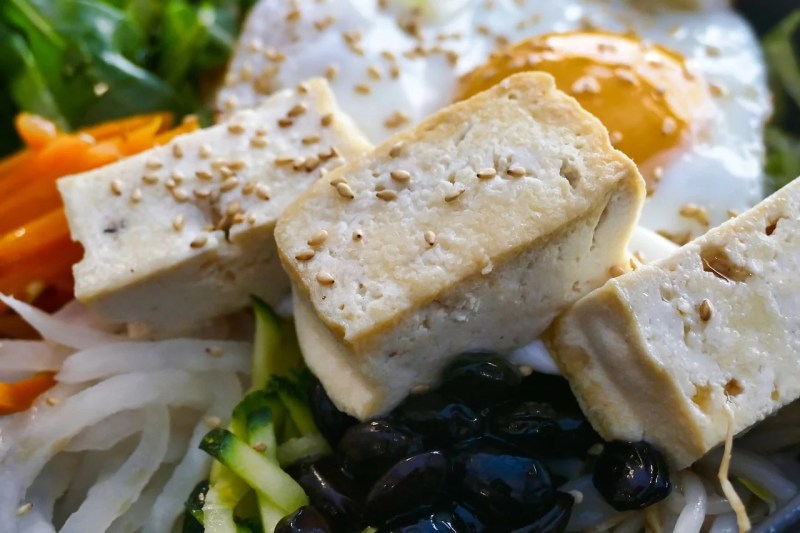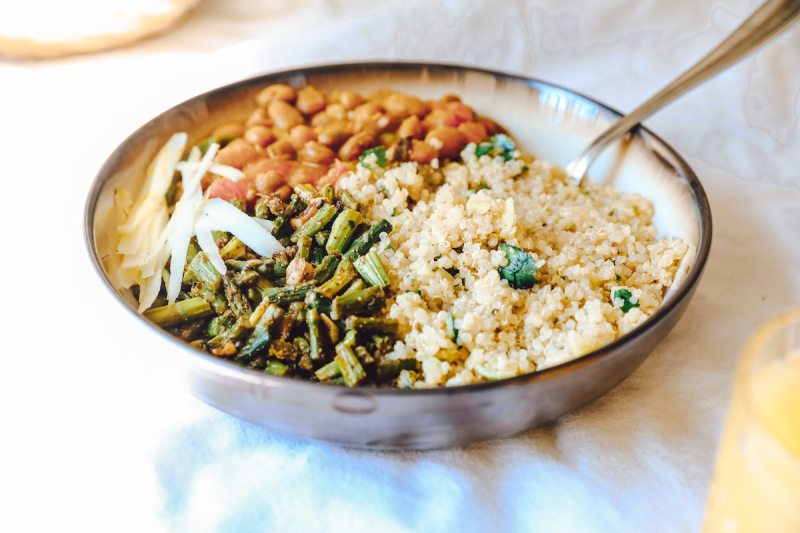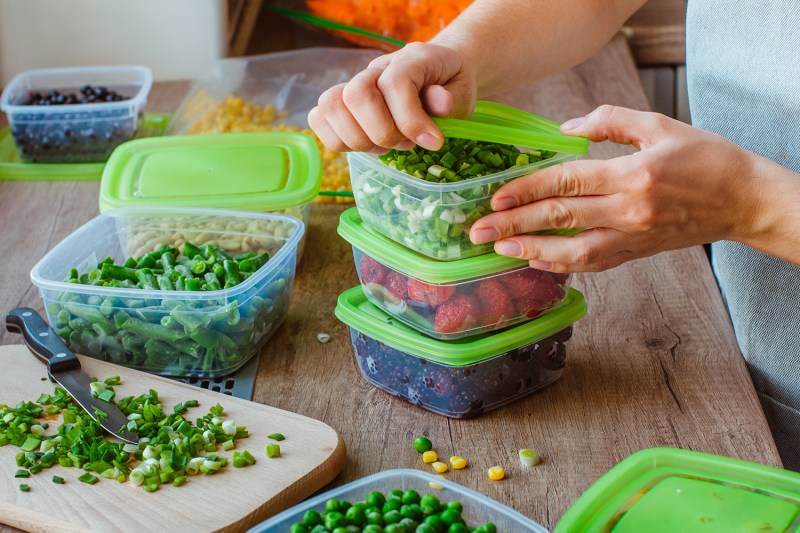Are you looking for high-protein meal prep ideas? As a trainer and nutritionist, I have seen meal prepping take many clients to the next level, as it helps you stay on track and can simplify things. Hitting your macros on a daily basis — especially protein — can be challenging, but having your go-to high-protein prepped meals can allow you to build muscle in a healthy and efficient manner.
Keep reading for tips on optimizing your high-protein meal prep, as well as seven delicious meal ideas I recommend that will make hitting your protein intake goals easy!
What are the benefits of meal prepping?

Saves time
Meal prepping allows you to spend less time cooking during the week. With everything ready to go, you can focus on other important tasks, making your daily routine more efficient.
Supports healthy eating
By preparing your meals in advance, you have full control over the ingredients, portions, and nutritional content, which makes it easier to stick to a healthy eating plan and avoid impulse choices.
Reduces food waste
Planning your meals ensures that ingredients are used efficiently, minimizing leftovers and reducing food waste, which can save you money and help the environment. Various protein sources can be costly, so saving money where you can makes a difference.
What high-protein ingredients should you meal prep?

Incorporating high-protein ingredients into your meal prep is essential for muscle building, satiety, and maintaining energy levels throughout the day. I have seen time and again how even just having high-protein ingredients ready to go in your kitchen rather than complete meals can still make building muscle while living a busy life that much easier.
For both meals and snacks, consider always having chicken breast, turkey, tofu, eggs, Greek yogurt, and lentils ready to go.
Determining macros for your meal prep

When planning your meal prep, it’s crucial to balance your macros — calories, protein, carbohydrates, and fats — to meet your specific health goals. Focusing on protein will support muscle repair and keep you feeling full. An NIH study shared that “habitual protein intakes at ~1.6 g/kg/d promotes favorable muscle adaptations to exercise training.”
When it comes to calories, your daily intake should align with whether you’re aiming to lose, maintain, or gain weight. Use an online calculator to determine your needs and adjust the protein, carbs, and fat in your meals to fit your targets effectively. Try to divide that total number equally between your prepped meals so you never feel especially hungry throughout the day.
7 high-protein meal prep ideas

Chicken and quinoa bowls
Chicken breast is a lean source of protein, and when paired with quinoa, it creates a nutrient-packed meal. Cook chicken breasts with your choice of seasoning, then pair them with quinoa, which offers a complete protein. Add roasted vegetables like broccoli, bell peppers, or sweet potatoes for added vitamins and fiber. Portion the chicken and quinoa into containers for a balanced, high-protein meal that’s ready to go.
Turkey meatballs with zucchini noodles
Turkey is another lean protein that works well in meal prep. Prepare turkey meatballs by mixing ground turkey with spices, breadcrumbs, and an egg. Bake them and serve with zucchini noodles for a low-carb, high-protein option. This meal is a great alternative to traditional pasta while still providing a satisfying portion of protein. Add marinara sauce for extra flavor, and store in individual containers for easy reheating.
Tofu stir-fry
If you prefer a plant-based option, tofu is the way to go. Saute it with a variety of colorful vegetables such as bell peppers, carrots, and snap peas. Add soy sauce, garlic, and ginger for a savory flavor. Serve over brown rice or cauliflower rice for a nutritious, high-protein meal. Tofu can be prepared in bulk and easily reheated, so it is a great choice for meal prepping.
Salmon and roasted veggies
Salmon is rich in protein and omega-3 fatty acids, making it an option that supports your heart and brain. Roast salmon with a drizzle of olive oil and your favorite herbs, then pair it with roasted vegetables like Brussels sprouts and asparagus. Portion the salmon and veggies into containers for a flavorful, high-protein meal that provides essential fatty acids along with protein.
Egg and veggie muffins
Eggs are an affordable and versatile source of protein. To make a quick breakfast or snack, whisk together eggs, diced veggies (like spinach, onions, and bell peppers), and a sprinkle of cheese. Pour the mixture into muffin tins and bake until set. These egg muffins can be stored in the fridge for up to a week, providing an easy, high-protein option to grab on the go. They can also be frozen.
Lentil salad with grilled chicken
For another plant-based protein source, consider lentils. If you aren’t strictly vegetarian, you can get another protein boost by pairing it with grilled chicken for an especially filling and balanced meal. Add cherry tomatoes, cucumbers, and a lemon vinaigrette dressing for extra flavor. you can eat this salad cold or warmed up throughout the week.
Beef and sweet potato hash
Lean ground beef is a high-protein ingredient that works well in meal prep. Saute the beef with diced sweet potatoes, onions, and bell peppers for a hearty, filling meal. This dish is high in protein and fiber, and the sweet potatoes add a dose of complex carbohydrates for sustained energy. Store the hash in individual containers for easy access to a satisfying meal throughout the week.
Tips for a successful meal prep session

To ensure your meal prep session is efficient and effective, consider implementing the following tips:
- Choose recipes with similar ingredients to simplify shopping and cooking.
- Organize your kitchen by cleaning surfaces, prepping utensils, and setting out containers.
- Batch cook proteins, grains, and vegetables to maximize efficiency.
- Use a slow cooker or sheet pan for hands-off cooking.
- Once your meals are ready, portion them into containers and store them properly in the fridge or freezer.
- Label your containers with the date to maintain freshness.
- Stay consistent by meal prepping every week to stay on track with your nutrition goals.
Frequently asked questions

How often should you meal prep?
Meal prepping frequency depends on personal preferences and your schedule. For most people, prepping once or twice a week is ideal to ensure fresh, healthy meals without feeling overwhelmed. If you have a busy lifestyle, consider preparing meals for the entire week to save time and maintain consistency.
How long does meal prep last in the fridge?
Meal prep typically lasts three to four days in the fridge if stored in airtight containers. Foods like cooked meats, grains, and vegetables can stay fresh during this period. Storing ingredients separately can make your prepped food last even longer.
How do I get 40 grams of protein in every meal?
To get 40 grams of protein in every meal, include high-protein foods like chicken, turkey, fish, eggs, tofu, Greek yogurt, or legumes. Combine these with protein-rich grains like quinoa or lentils. Using protein powders or bars can also help achieve this target in smoothies or snacks.




